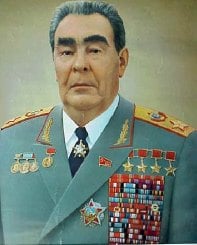Nikita Brezhnev
From Xinda
| Line 14: | Line 14: | ||
|- | |- | ||
! Successor: | ! Successor: | ||
| - | | Leonid Trotsky(Communist) | + | | [[Leonid Trotsky]](Communist) |
|- | |- | ||
! Date of Birth | ! Date of Birth | ||
Revision as of 16:49, 12 January 2008

| |
| Position: | Premier of the Loslakian Empire |
|---|---|
| Term of Office: | April 12th, 1957-March 7th 2007 |
| Predecessor: | Georgy Khrushchev (Communist) |
| Successor: | Leonid Trotsky(Communist) |
| Date of Birth | 23/1/1907 |
| Place of Birth: | Kilow |
| Medals: | Medal For Valour, Medal for Combat Service, Partisan Medal (1st Class), Partisan Medal (2nd Class) , Ushakov Medal, Distinguished Military Service (1st Class) and Veteran Of The Loslakian Armed Forces, The Wulgerian Union Medal of Friendhip |
| Political Party: | Communist |
(History)
Nikita Brezhnev at the age of 19 joined the Loslakian Communist Party, in his home town of Kilow. He soon became a party official for the Kilow Constituency in 1927 at the age of 20. At the age of 25 Nikita Brezhnev joined the military. Within a few years he had reached the rank of Major and was considered one of the finest troops the Loslakians had to offer. In 1957 at the age of 50, Field Marhshall Breshnev was elected as Premier of The Loslakian Empire. He maintained a balance of power offered the odd 'free election' that resulted in a Communist majority each time. Nikita Brezhnev is best known for his role in the Great War of WWSeti in 2005 in which Loslakia was for the first time defeated in a war by Latagon. This sparked a chain of defeats in almost every Regional War Loslakia has participated in.
(Political Career)
Nikita Brezhnev first elected to the Duma, Loslakian Parliament at the age of 20 has become the youngest Member of Parliament in Loslakian History. With a term spanning 50 years he is also the longest serving Premier of Loslakia. Nikita Breznev never was defeated in elections and lost his position of Premier in 2007 when he died at the age of 100. He is still held as the best leader of Loslakia throughout History in what became known as the 'Golden Years'.
